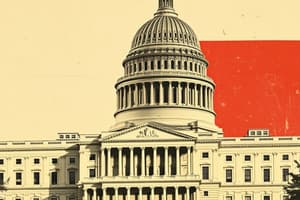Podcast
Questions and Answers
What is one of the primary roles of the Legislative Branch in the United States?
What is one of the primary roles of the Legislative Branch in the United States?
- Appointing federal judges
- Enforcing international treaties
- Creating and shaping laws (correct)
- Implementing Supreme Court decisions
In the United States, what is the primary focus of Congress when legislating?
In the United States, what is the primary focus of Congress when legislating?
- Educational curriculum standards
- Foreign affairs and national defense (correct)
- State-level public health policies
- Local infrastructure development
Which government body oversees the executive branch through its power of approval and oversight?
Which government body oversees the executive branch through its power of approval and oversight?
- Supreme Court
- House of Lords
- Senate (correct)
- Justice Department
What is an essential step in the legislative process before a bill becomes law in the United States?
What is an essential step in the legislative process before a bill becomes law in the United States?
Which level of government in the United States has jurisdiction over matters like education and public health?
Which level of government in the United States has jurisdiction over matters like education and public health?
In the U.S., whose primary function is to interpret laws and ensure they comply with the Constitution?
In the U.S., whose primary function is to interpret laws and ensure they comply with the Constitution?
What is required for a bill to become a law in the United States?
What is required for a bill to become a law in the United States?
In the U.S. court system, what type of cases does the Supreme Court have original jurisdiction over?
In the U.S. court system, what type of cases does the Supreme Court have original jurisdiction over?
What power does Congress have in relation to the executive branch's nominations?
What power does Congress have in relation to the executive branch's nominations?
How can Congress override a presidential veto?
How can Congress override a presidential veto?
What does appellate jurisdiction refer to in the U.S. court system?
What does appellate jurisdiction refer to in the U.S. court system?
Why is the checks and balances system important in the U.S. government?
Why is the checks and balances system important in the U.S. government?
Study Notes
The Legislative Branch and Jurisdiction
The Legislative Branch, encompassing Congress in the United States, is a vital pillar of our government, responsible for creating and shaping laws that govern our society. To better understand its role and scope, let's delve into the various facets of the legislative process, jurisdiction, and the checks and balances system.
Roles of the Legislative Branch
The Legislative Branch's primary roles are to make laws, allocate funds, and oversee the executive branch through its power of approval and oversight. Members of Congress, consisting of the Senate and the House of Representatives, represent their constituents and debate, discuss, and vote on proposed legislation.
Federal vs. State Jurisdiction
The United States Constitution delineates the jurisdiction of the federal government and the states. Congress primarily legislates on matters of national importance, such as foreign affairs, interstate commerce, and national defense. State governments, on the other hand, have jurisdiction over matters of local concern, including education, public health, and local infrastructure. State jurisdiction often takes precedence over federal jurisdiction unless the Constitution explicitly grants power to the federal government.
Legislative Process
The legislative process begins when a bill is introduced in either the House or Senate, then passes through a series of steps before it becomes law. A bill must pass both chambers of Congress and receive the president's signature or lack thereof before it becomes a law. If the president vetoes the bill, Congress has the power to override the veto with a two-thirds majority vote in both chambers.
Checks and Balances
The checks and balances system, outlined in the Constitution, prevents any single branch of government from becoming too powerful. The Legislative Branch has unique checks on the executive branch, such as the power to approve or reject executive nominations, including those to the Supreme Court and other federal agencies. Congress also has the power to investigate the executive branch and impeach federal officials.
Original vs. Appellate Jurisdiction
The United States court system is divided into two types of jurisdiction: original and appellate. Original jurisdiction refers to the authority of a court to hear cases directly. The United States Supreme Court, for example, has original jurisdiction over a small number of cases, such as cases between states and cases in which a state is a party. Appellate jurisdiction refers to the authority of a court to hear appeals from lower courts. The Supreme Court has appellate jurisdiction for most cases, hearing appeals from the federal courts of appeals and the highest state courts.
As you can see, the Legislative Branch plays a crucial role in our government, and its jurisdiction, processes, and checks and balances are essential to our political system and the preservation of our rights and freedoms. Understanding these concepts is vital for informed citizenship and participation in our democracy.
Studying That Suits You
Use AI to generate personalized quizzes and flashcards to suit your learning preferences.
Description
Test your knowledge on the roles, jurisdiction, legislative process, and checks and balances system of the Legislative Branch in the United States government. Explore topics such as federal vs. state jurisdiction, the legislative process, checks on the executive branch, and original vs. appellate jurisdiction in the court system.




